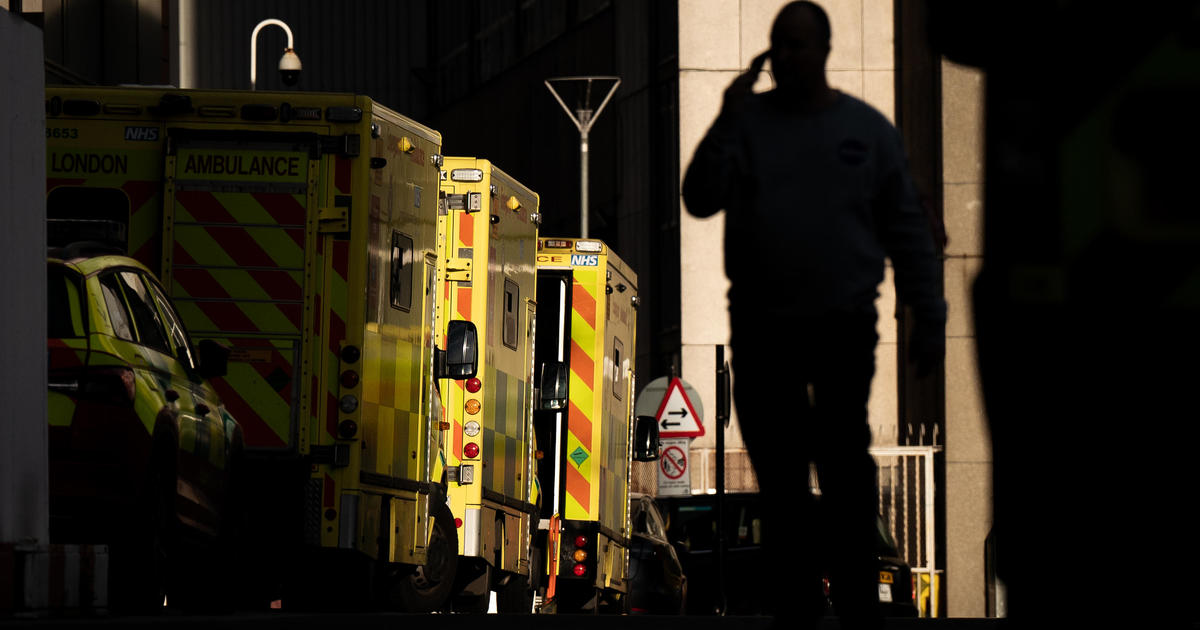U.K. National Health Service delays drive some Ukrainian refugees to return to war zone for quick care

London — Sasha has been struggling to sleep for weeks. She escaped the bullets and bombs raining down on her hometown of Zaporizhzhya, in eastern Ukraine, and reached the U.K. as a refugee in December, but the effects of the war have left her with severe PTSD and anxiety.
“I’m living on three to four hours of sleep on good days, and on a bad day, I don’t have any sleep at all and just feel like blacking out,” she told CBS News.
Depression and panic attacks drove Sasha to seek an emergency appointment through Britain’s National Health Service, the NHS, hoping to get a new prescription for medication. But Sasha found herself on a lengthy waiting list for an appointment, and now, despite the war still raging in her country, she’s considering a drastic alternative — going back home to get immediate medical treatment.
“It would be faster for me just to fly over to Ukraine than to wait for these appointments,” she told CBS News.
Aaron Chown/PA Images via Getty
“I come from quite a hot region in terms of the scale of the war you have over there, as it’s in the very east of Ukraine,” Sasha said. But still, she said she could “get an appointment just the next day.”
It’s a familiar story to some of the estimated 162,700 Ukrainians who have come to Britain seeking an escape from the dire conditions back home.
Sasha and other Ukrainian refugees who spoke to CBS News have painted a picture of a speedy and resilient Ukrainian health care system still able to provide routine care despite the war, which enters its second year later this week. But they also provided a damning insight into the crisis engulfing Britain’s cherished but beleaguered NHS. The refugees all asked to be identified only by their first names for privacy reasons.
Critics say the 75-year-old public health service has been plagued by underfunding for more than 12 years under governments run by the Conservative Party, and it has come under enormous strain in recent months, struggling to recover from the onslaught of the coronavirus pandemic amid staff shortages and a series of labor strikes as public sector workers demand pay rises to help them cope with record-high inflation and a severe cost of living crisis.
It’s a crisis evident in data: According to the British Medical Association, a record-high 3.1 million people were waiting over 18 weeks for non-urgent treatment as of December 2022.
The average wait time for non-urgent treatment is 14 weeks — significantly higher than the median pre-COVID wait of eight weeks in December 2019, the BMA data show.
Analysis by the U.K.’s Office for National Statistics shows more than 1 in 10 job vacancies posted online in December were in health care — more than in any other sector in the country’s economy.
“For the last 15 years, our nurses’ pay and doctors’ pay has dropped by 30%,” Dr. Andrew Meyerson, an emergency room doctor, told CBS News in January. “We have half of our hospital setting up food banks for NHS staff. … We just can’t afford to live.”
There have been some improvements recently, with patients waiting less time for ambulances and receiving faster emergency care in January compared to December 2022, according to the most recent NHS data.
Olha, another Ukrainian refugee, told CBS News she had returned home multiple times for health care appointments since the war began.
“It has become a meme amongst the Ukrainians living in the U.K., but the reality of undiagnosed diseases due to lack of accessibility to the NHS is scary,” she said.
Maiia left Kyiv not long after the war started and found refuge in east London. In December, she experienced “very strong pain simultaneously in my ears, teeth, and near my eye,” and she tried to get treatment from her local NHS doctor.
Despite multiple attempts, she said she was unable to get a face-to-face appointment with a doctor. Over-the-counter painkillers didn’t help, so she decided to go to the emergency room as “the pain was so strong that I could not bear it.”
After a four-hour wait, she was handed more over-the-counter painkillers despite insisting to staff that she had already tried them. They still didn’t help.
Maiia expressed praise for the fact that Britain’s universal health care system is accessible to everyone and free at the point of care, including to herself and other refugees, but she “decided that the best option would be to go to Ukraine and see the doctors there.”
After a dangerous trip to Ukraine, driving from Poland to Kyiv, Maiia was referred to a local dentist who quickly diagnosed the problem. The pain was coming from pulpitis, a condition where the innermost tissue in your tooth becomes inflamed. A Ukrainian doctor extracted her tooth almost immediately.
Mariia Kaschenko, Anhelina Shamlii and Victoria Stepanets contributed to this report.
Share this news on your Fb,Twitter and Whatsapp
Times News Network:Latest News Headlines
Times News Network||Health||New York||USA News||Technology||World News
